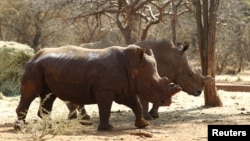A South African court has sentenced a Thai national to 40 years in prison for circumventing a ban on the export of rhino horns.
Chumlong Lemtongthai had pleaded guilty to organizing bogus trophy hunts to obtain rhino horns for sale on the international black market.
The sentence handed down in Johannesburg Friday is the harshest ever given for a wildlife crime in South Africa.
However, the World Wildlife Fund says it is concerned that charges against Lemtongthai's co-defendants -- three South Africans and two Asian nationals -- were withdrawn without explanation.
The WWF says the move does not send a "strong message" regarding South Africa's attitude to the involvement of its own citizens in rhino crimes.
Jo Shaw, the WWF's South Africa Rhino Coordinator, said it is important that people involved in rhino crimes receive sentences that match the severity of their actions to form "an effective deterrent to others."
Officials say a record 528 rhinos have been killed in South Africa this year. Demand for rhino horns has soared in Asia, where they are widely believed to have medicinal qualities, despite evidence to the contrary.
Chumlong Lemtongthai had pleaded guilty to organizing bogus trophy hunts to obtain rhino horns for sale on the international black market.
The sentence handed down in Johannesburg Friday is the harshest ever given for a wildlife crime in South Africa.
However, the World Wildlife Fund says it is concerned that charges against Lemtongthai's co-defendants -- three South Africans and two Asian nationals -- were withdrawn without explanation.
The WWF says the move does not send a "strong message" regarding South Africa's attitude to the involvement of its own citizens in rhino crimes.
Jo Shaw, the WWF's South Africa Rhino Coordinator, said it is important that people involved in rhino crimes receive sentences that match the severity of their actions to form "an effective deterrent to others."
Officials say a record 528 rhinos have been killed in South Africa this year. Demand for rhino horns has soared in Asia, where they are widely believed to have medicinal qualities, despite evidence to the contrary.






